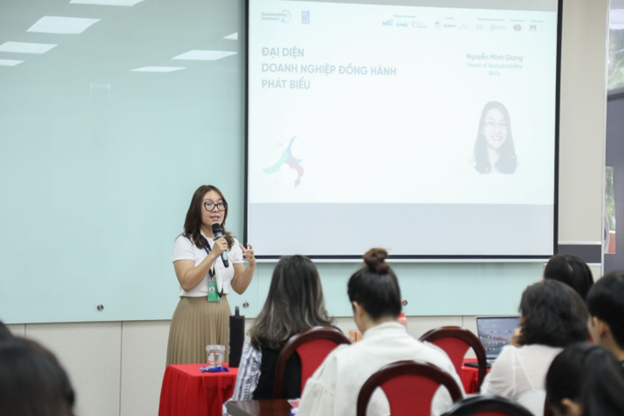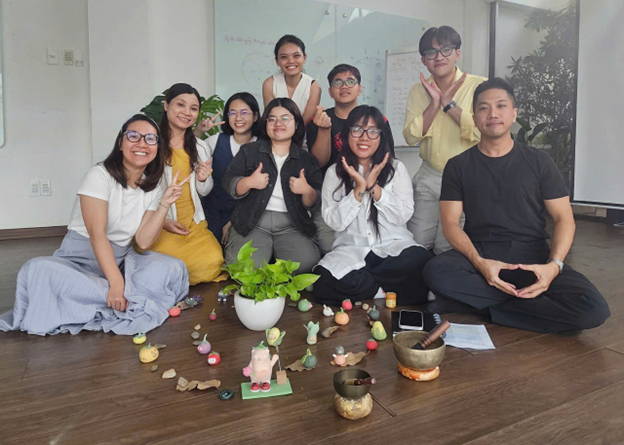“One phone-free hour gave me time to play with my child and felt like a return to my own childhood,” said a parent after experiencing the Happiness Station set up by Biti’s in Ho Chi Minh City. The reflection partly illustrates the unique philosophy of Vietnam’s leading footwear company: happiness begins with simple things, yet has the power to spread widely.
Given climate change and economic uncertainties, sustainability is no longer a slogan but a matter of survival for businesses. While most CSR activities have traditionally been outward-facing—towards supply chains, customers, and communities—Biti’s has chosen a different path: starting from within, with people, with happiness.
From global philosophy to internal needs
Since 2018, Biti’s has launched the Happy Biti’s project, inspired by Bhutan’s Gross National Happiness (GNH) Index. Nearly 10,000 employees have participated in happiness skills training, workshops, and internal activities that improve mental health, connection, and productivity.
According to a survey, many young people today seek meaning and harmony in their jobs—where work aligns with community values and personal happiness.
This is both a challenge and an opportunity for businesses. Research by the Saïd Business School (Oxford University) and BT (UK) shows that happy employees are up to 13% more productive. Clearly, a culture of happiness not only helps retain talent but also directly impacts business performance.
Happy Biti’s – A journey that starts from within
In Vietnam, Biti’s has been a pioneer in bringing the happiness philosophy into the workplace. Since 2018, Happy Biti’s has introduced happiness skills training inspired by Bhutan’s GNH.
Beyond workshops, Biti’s restructured many internal activities to make happiness part of its corporate culture—spreading from within the company outward to society.
The program has engaged nearly 10,000 employees, improving physical and mental well-being as well as workplace cohesion. According to company leaders, personal happiness is the foundation for radiating happiness into the community and building a business that is sustainable both economically and socially.
CEO Vuu Le Quyen reiterated the role of “inner happiness” in motivating individuals to contribute to society: “Sustainable development should start from within. Sustainable individuals and families will create a sustainable society and nation.”
Notably, Biti’s philosophy reflects a global trend. The world is embracing Inner Development Goals (IDGs)—personal development—as a foundation to realize the 17 Sustainable Development Goals (SDGs). If the SDGs address “what we need to change” at the macro level, the IDGs focus on “how we need to change” at the personal and organizational level.
Happiness reaches the younger generation
In 2023, Biti’s extended its initiative with Happy Kids, aimed at children aged 3–10. A highlight of the project is the Happiness Station in HCMC—a space where parents and children connect by putting away phones for 60 minutes to fully experience family bonding.
The station features three areas: Connecting with Self, Connecting with Others, and Connecting with Nature. The activities were designed under the guidance of Prof. Dr. Ha Vinh Tho, former director of Bhutan’s Gross National Happiness Centre, to bring happiness philosophy closer to everyday life for Vietnamese children.
By the end of 2024, the station had welcomed more than 500 families. Many parents shared that the experience gave them quality time with their children while also offering a chance to reflect on themselves. Some families returned multiple times despite busy schedules or harsh weather—evidence of the real and urgent need for such family-connection spaces.
Share a bear – spreading love beyond the city
The Happiness Station extends beyond urban families. In December 2024, to mark its one-year anniversary, the station collaborated with JCI South Saigon to launch the Share A Bear campaign, donating nearly 300 teddy bears to disadvantaged children in Krong Pa, Gia Lai Province.
This was more than charity—it was a message: happiness can spread through simple actions. A local teacher requested more bears for her class due to a shortage of toys, underscoring the great emotional value of these small gifts.
The mascot Mindful Bear—symbolizing mindfulness—accompanied the children in various activities. With its charming lotus leaf hat and lotus bell, the bear not only captivated the kids but also became a symbol of the philosophy “mindfulness brings happiness.”
By the end of 2024—just one year after its launch—the Happiness Station had become “a symbol of connection and shared love,” linking charitable projects and nurturing compassion in the community. Events such as “Christmas for Children” and workshops at the University of Social Sciences and Humanities (VNU-HCMC) created forums for students, lecturers, and parents to discuss and experience happiness in practical ways.
Biti’s also partnered with Dear Our Community in the Sustainability Incubator with Youth Program Cohort 3, encouraging students to research and practice happiness as part of sustainability.
Surveys show that while young people are socially aware and eager to engage, they often lack self-awareness and long-term thinking. This is why Biti’s continues to support the next generation in nurturing inner strength to better contribute to society.
More “Happiness Stations” needed
From the experience of the Happiness Station, many parents and experts expressed their wish for more such spaces. In a context where children are increasingly attached to screens and online games, activities that emphasize emotional connection and spiritual nourishment are urgently needed.
According to UNICEF, around 3 million children in Vietnam need mental health care. This alarming figure underscores the importance of initiatives like the Happiness Station in supporting families during children’s critical developmental years.
What makes Biti’s stand out is not just a single CSR project, but its approach of turning happiness into a living culture. That culture starts internally (Happy Biti’s), extends to children (Happy Kids, Happiness Station), and then reaches out to the community (Share A Bear, charitable activities).
When asked about building happiness skills for young employees, Nguyen Minh Giang, head of Sustainability & ESG at Biti’s, shared: “We must dig deep to build our core values. Once we have firm grounding and deep connection with ourselves—knowing who we are and what we’re capable of—we can reach further and create impact for society.”

Happiness – The key to retaining Gen Z and building sustainability
From an HR perspective, a happiness culture helps answer the eternal question: how to retain young talent? Instead of relying only on pay and bonuses, businesses can create a “reason to stay”—a positive environment, a meaningful journey, and a long-term vision.
From a social perspective, initiatives like the Happiness Station help address challenges in mental health and family bonding. From one small space in HCMC, the project has sown seeds for a larger goal: spreading happiness to one million Vietnamese families.
From a branding perspective, Biti’s has built the image of a humane company that listens and walks alongside its employees and communities. This is the “quiet strength” that makes the brand sustainable not only in business but also in people’s hearts.
In its journey of inside-out sustainability, Biti’s demonstrates a simple yet profound truth: happiness is not only a destination—it is also the path. And on that path, every individual, every family, and every community can contribute together.
(*) The author is Content Lead at Dear Our Community — an impact-driven enterprise and a multi-stakeholder collaboration platform that accompanies, invests in, and connects young generations to implement sustainability solutions — built on a broad network of businesses, organizations, experts, and universities.









